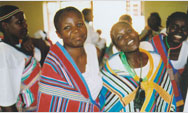Democracy and Governance in South Africa
The Development Challenge: South Africa celebrated a decade of democracy in 2004, and held its third consecutive national democratic elections. However, ten years after its peaceful transition from apartheid, much remains to be done to address past constraints and inequities. The coming years are equally important for South Africa's future in order to ensure continued stability, to consolidate democracy, and to focus on addressing the key challenges of unemployment, crime, HIV/AIDS, and housing.
The South African government has fostered the transformation of a closed, insular economy to one that is open and driven by free market principles. Sound economic management has resulted in steady real economic growth for a record six straight years. However, growth has been too slow to reduce poverty, to significantly reduce unemployment, or to tackle the unequal distribution of wealth. In a 2004 survey, South Africans ranked unemployment--estimated at 27.8%--as the country's most serious problem. The government lacks sufficient data on the demographics of the poor, making it difficult to target anti-poverty programs effectively. After his re-election in 2004, President Thabo Mbeki declared that the government would stimulate the growth of the country's small, medium, and micro enterprises, which employ approximately 66% of the workforce and generate 35% of the country's gross domestic product.
While official statistics show that crime rates are slowly declining, crime remains a central concern for the government because it directly impacts people's lives and undermines public confidence and investment. Crime ranks as the second highest concern of South African citizens. Corruption--the country's most prevalent crime, after burglary--diverts resources from addressing citizen needs, particularly the poor. South Africa also has one of the world's highest incidences of gender-based violence, including rape, a condition that has the potential to derail other social and economic gains.
South Africans' life expectancy has decreased dramatically since 1994, primarily due to the rapid spread of HIV/AIDS. HIV prevalence has now risen to 27.9% of pregnant women. With 5.6 million infected citizens, South Africa has more HIV-infected people than any other country. HIV/AIDS and tuberculosis are closely linked; one fuels the other, leading to numerous deaths and adding to an over-burdened health care system. Vulnerability to HIV/AIDS is greatest in informal settlements, where poverty, labor migration, domestic violence, rape, and the breakdown of family norms all are contributing factors. The South African government began the rollout of a comprehensive HIV/AIDS program, including anti-retroviral treatment, in April 2004.
Local government is essential to South Africa's socioeconomic development. Municipalities are responsible for providing basic services such as water and sanitation, but 10 million historically disadvantaged South Africans live in slums and are under-served with regard to basic shelter, water and sanitation, power, and transport services. To deal with the country's housing problem, the government has proposed constructing 300,000 housing units annually for the next 10 years--with $7 billion in urban infrastructure required to bring housing and services to minimum acceptable standards for the majority of the historically disadvantaged population.
Education is key to sustainable socioeconomic development, but the legacy of apartheid poses challenges in South Africa. The apartheid system excluded blacks in South Africa from receiving quality education in areas such as math and science that provide the skills needed for higher paying jobs. Despite significant gains in the last ten years, many rural schools still do not have qualified math, science, and technology teachers.
The United States has a strong national interest in South Africa as a leader in sub-Saharan Africa and as a trading partner. South Africa is active in regional bodies such as the African Union, the New Partnership for Africa's Development, and the Southern African Development Community. South Africa plays a leading role in promoting peace and stability around the continent, and has been actively engaged in efforts to resolve conflicts in the Democratic Republic of Congo, Cote d'Ivoire, Rwanda and Burundi. South Africa is a positive example for its African neighbors with its tremendous strides toward ruling justly and investing wisely in people and their economic freedom.
(Excerpted from the 2006 Congressional Budget Justification for South Africa)
Back to Top ^
|


